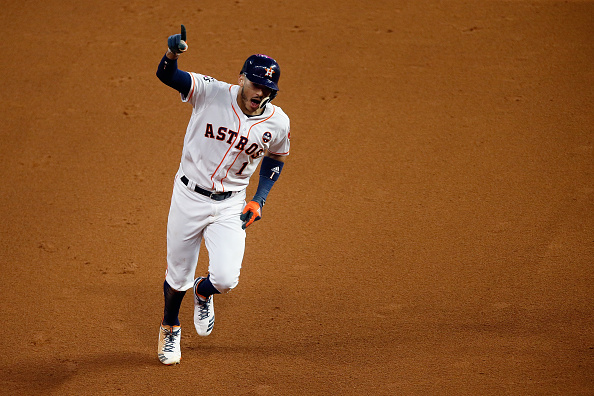Does the first round matter?
What kind of a question is that? Of course it matters.
.jpg) Don’t let some crotchety analyst beat you down and tell you it doesn’t matter because they’re tired of the old, “I’m picking fourth overall, who should I take?” question. They’ll hit you with things like six of the Top 15 picks last year failed to return first-round value and you’re splitting hairs by debating between Kris Bryant and Nolan Arenado. While that may be true and yes, we all know that fantasy baseball leagues are won in the later rounds of the draft where being a knowledgeable and savvy owner pays off in spades, it in no way means your first-round pick doesn’t matter.
Don’t let some crotchety analyst beat you down and tell you it doesn’t matter because they’re tired of the old, “I’m picking fourth overall, who should I take?” question. They’ll hit you with things like six of the Top 15 picks last year failed to return first-round value and you’re splitting hairs by debating between Kris Bryant and Nolan Arenado. While that may be true and yes, we all know that fantasy baseball leagues are won in the later rounds of the draft where being a knowledgeable and savvy owner pays off in spades, it in no way means your first-round pick doesn’t matter.
Your first-round pick sets the tone for your draft.
Are you a homer? Are you someone who routinely buys into the hype machine? Do you value top-tier starting pitching above offense? Do you even know what ‘position scarcity’ means? At least one of these questions will be answered by whichever player you decide to take with your first pick.
It’s like playing poker. Maybe you’re familiar with some of the players at the table, maybe others you’re meeting for the first time. It’s your job to read them by their betting habits, facial expressions, tone of voice, etc. Well, your fantasy baseball draft is no different and it all starts with the first round.
If the owner picking third overall opts to take Clayton Kershaw, you know you’ve got someone who either A. Lives and dies by his starting pitching or B. Doesn’t understand the overall depth at starting pitching. Either way, if you’re selecting near that owner, you are already getting an idea as to who may be available at your pick or, even better, who you may be able to leave for another round because you don’t believe he will steal him from you.
If an owner decides to take Trea Turner with the third overall pick and bypasses the likes of Paul Goldschmidt or Nolan Arenado, you can make the assessment that they are potentially concerned about ‘position scarcity’ (whether they truly know what that means or not) and/or they are someone who values speed early and are expecting to land power further down the draft board.
Last season, those who took Turner were a combination of the two but you could also mix in they were someone who buys into the hype. Turner was a very trendy pick last year with only half a season’s worth of stats to his credit, yet because analysts were gushing so much about what he did in the second half of 2016, fantasy owners were drafting him based more on hope and speculation.
Turner struggled out of the gate and before he landed on the DL with an early-season injury, his being drafted in the first round was reminiscent of those who drafted Carlos Correa in the first round of 2016. Similarly, Correa had just half a season under his belt, but people were so excited about what he did in those three months, they assumed you could just double those numbers and prorate for a full season. Both players failed to live up to their hype and neither delivered first-round value that year, but is that enough of a reason to say the first round doesn’t matter?
Absolutely not.
You can tell a lot about a fantasy owner who makes a trendy pick with his/her first-round selection. People who routinely buy into the hype machine are easily manipulated in drafts. You can see the concern on their faces as overhyped players they covet begin to rise on the player list in your draft room. With just a little bit of chatter, you can plant seeds of doubt and concern in their heads and get them to reach on a player by a few rounds. They’re also the ones who instantaneously join in on a position run for fear of missing out on their favorite catcher or closer.
Yeah, people! We’re talking about some serious psychological warfare here. When you’re deciding on which player you’re going to take with your first pick, know that it is the first bit of information you’re about to reveal with regard to what type of fantasy player you are. What kind of statement do you want to make? Each and every pick you make afterwards is going to reveal a little more information about your draft strategy, your player preferences and at what level you’re going to play this season. So pick a strategy. Set a game-plan. Find that first guy who tells the league you're here to win.
Set the tone properly.
Don’t just make a selection. Make a statement.

